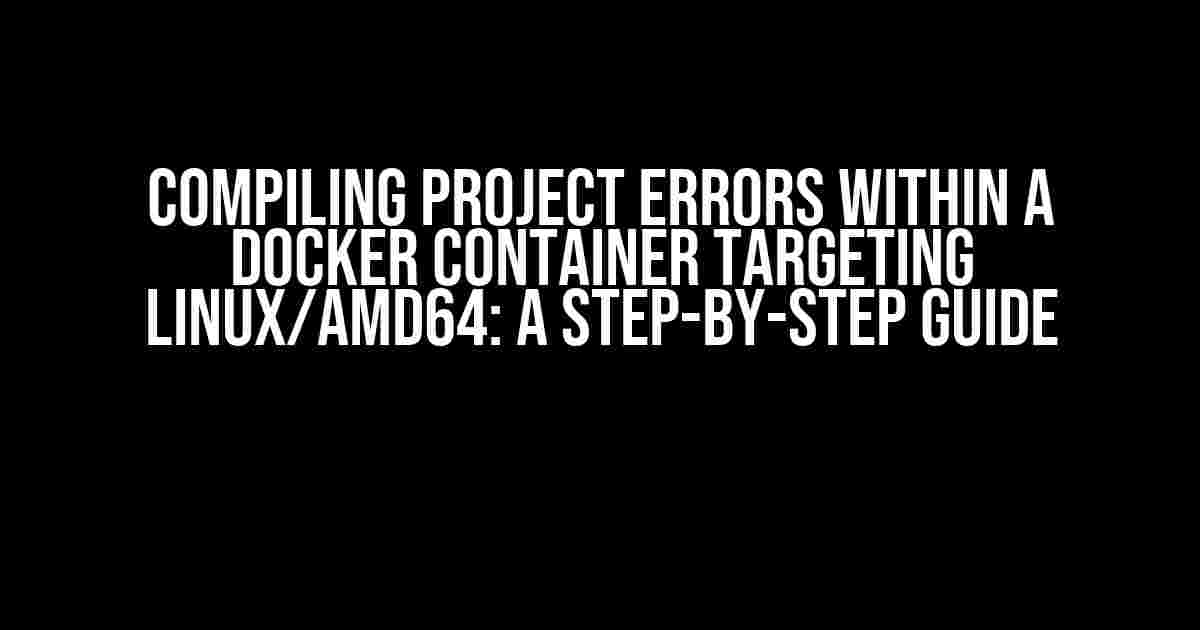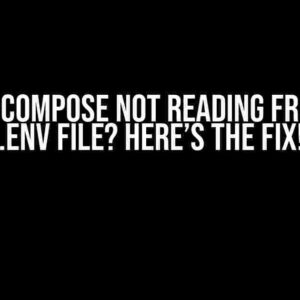Are you tired of dealing with compilation errors within your Docker container targeting Linux/amd64? Do you find yourself lost in a sea of cryptic error messages and uncertain about where to start troubleshooting? Fear not, dear developer! In this comprehensive guide, we’ll walk you through the most common compilation errors, provide clear explanations, and offer practical solutions to get your project up and running smoothly.
Understanding the Docker Container Environment
Before diving into the nitty-gritty of compilation errors, it’s essential to understand the Docker container environment. When you run your project within a Docker container, you’re essentially creating a self-contained, isolated environment that includes everything your project needs to run, including the operating system, dependencies, and libraries.
When targeting Linux/amd64, you’re telling Docker to create a container that mimics a Linux environment on an AMD64 architecture. This allows you to develop and test your project in a environment that’s identical to the production environment, ensuring compatibility and reducing the risk of unexpected issues.
Common Compilation Errors and Solutions
Now that we’ve covered the basics, let’s dive into the most common compilation errors you may encounter within a Docker container targeting Linux/amd64.
Error 1: Missing Dependencies
Error message: error: dependency 'libXXX' not found
Cause: Missing or incorrect installation of dependencies within the Docker container.
Solution:
apt-get update && apt-get install -y(for Debian-based systems)apk add --no-cache(for Alpine-based systems)
Explanation: Make sure to update the package list and install the required dependencies. You can do this by adding the necessary commands to your Dockerfile or running them manually within the container.
Error 2: Incompatible System Libraries
Error message: error: cannot find -lXXX
Cause: Incompatible or missing system libraries within the Docker container.
Solution:
RUN ldconfig RUN apt-get install -y libXXX-dev (for Debian-based systems) RUN apk add --no-cache libXXX-dev (for Alpine-based systems)
Explanation: The ldconfig command updates the system’s library cache, ensuring that the system can find the required libraries. Then, install the development package for the missing library using the apt-get or apk commands.
Error 3: Compiler Version Issues
Error message: error: compiler version not supported
Cause: Incompatible or outdated compiler version within the Docker container.
Solution:
FROM gcc:latest ENV CC=gcc ENV CXX=g++
Explanation: Update your Dockerfile to use the latest GCC compiler version. You can also specify the compiler version explicitly using environment variables.
Error 4: Header Files Not Found
Error message: error: header file 'XXX.h' not found
Cause: Missing or incorrect installation of header files within the Docker container.
Solution:
RUN apt-get install -y libXXX-dev (for Debian-based systems) RUN apk add --no-cache libXXX-dev (for Alpine-based systems)
Explanation: Install the development package for the missing header file using the apt-get or apk commands.
Troubleshooting Compilation Errors
When encountering compilation errors, it’s essential to follow a structured approach to identify and resolve the issue efficiently. Here’s a step-by-step guide to troubleshooting compilation errors within a Docker container targeting Linux/amd64:
- Check the error message: Read the error message carefully to understand the problem. Look for keywords, such as “dependency,” “library,” or “header file,” to identify the root cause.
- Verify dependencies: Check if all dependencies are installed and up-to-date. Run
apt-get update && apt-get install -y(for Debian-based systems) orapk add --no-cache(for Alpine-based systems) to ensure dependencies are installed correctly. - Check system libraries: Verify if the required system libraries are installed and configured correctly. Run
ldconfigto update the system’s library cache, and then install the development package for the missing library using the apt-get or apk commands. - Verify compiler version: Check the compiler version within the Docker container. Update your Dockerfile to use the latest GCC compiler version or specify the compiler version explicitly using environment variables.
- Check header files: Verify if the required header files are installed and configured correctly. Install the development package for the missing header file using the apt-get or apk commands.
- Review Dockerfile and configuration files: Double-check your Dockerfile and configuration files (e.g.,
.dockerignore,Docker-compose.yml) for any errors or inconsistencies. - Search online resources: If you’re still stuck, search online resources, such as Stack Overflow, Docker documentation, or GitHub issues, for similar error messages and solutions.
Best Practices for Compiling Projects within a Docker Container
To minimize compilation errors and ensure a smooth development experience, follow these best practices for compiling projects within a Docker container targeting Linux/amd64:
- Keep your Dockerfile up-to-date: Regularly update your Dockerfile to ensure you’re using the latest dependencies, compiler versions, and system libraries.
- Use a consistent base image: Stick to a consistent base image, such as
ubuntu:latestoralpine:latest, to ensure compatibility and reduce errors. - Define dependencies explicitly: Clearly define dependencies in your Dockerfile or configuration files to avoid confusion andensure correct installation.
- Use environment variables wisely: Use environment variables to control compiler versions, dependencies, and system libraries, making it easier to switch between different configurations.
- Test and iterate: Regularly test your Docker container and iterate on your Dockerfile and configuration files to ensure a stable and efficient development environment.
| Error Category | Error Message | Solution |
|---|---|---|
| Missing Dependencies | error: dependency 'libXXX' not found |
apt-get update && apt-get install -y or apk add --no-cache |
| Incompatible System Libraries | error: cannot find -lXXX |
ldconfig and apt-get install -y libXXX-dev or apk add --no-cache libXXX-dev |
| Compiler Version Issues | error: compiler version not supported |
Update Dockerfile to use latest GCC compiler version or specify compiler version explicitly using environment variables |
| Header Files Not Found | error: header file 'XXX.h' not found |
apt-get install -y libXXX-dev or apk add --no-cache libXXX-dev |
By following this comprehensive guide, you’ll be well-equipped to tackle common compilation errors within a Docker container targeting Linux/amd64. Remember to stay calm, methodically troubleshoot issues, and keep your Dockerfile and configuration files up-to-date to ensure a smooth development experience.
Frequently Asked Question
Are you stuck with compiling project errors within a Docker container targeting Linux/amd64? Don’t worry, we’ve got you covered! Here are some frequently asked questions and answers to help you troubleshoot and resolve common issues.
Q: Why am I getting “file not found” errors when compiling my project within a Docker container?
A: This error usually occurs when the Docker container’s working directory is not set correctly. Make sure to specify the working directory in your Dockerfile using the WORKDIR instruction, or use the -w flag when running your command in the Docker container.
Q: How do I fix “cannot find package” errors when compiling my Go project within a Docker container?
A: This error can occur when the Go module dependencies are not properly installed or cached. Try running the command go mod download or go get to download and install the required dependencies. You can also try setting the GOPROXY environment variable to a proxy server to speed up the downloading process.
Q: Why am I getting permission errors when compiling my project within a Docker container as a non-root user?
A: This error occurs when the non-root user within the Docker container doesn’t have the necessary permissions to access the files or directories. Try using the USER instruction in your Dockerfile to switch to a non-root user and set the permissions accordingly. You can also use the chmod command to set the permissions manually.
Q: How do I troubleshoot compilation errors that occur within a Docker container?
A: To troubleshoot compilation errors, try running the compilation command with the -x flag to get more detailed output. You can also use tools like Docker Compose or Docker exec to inspect the container’s environment and file system. Additionally, check the Docker container’s logs using the docker logs command to get more information about the error.
Q: Can I use a Docker container as a development environment for my project, and how does it affect compilation?
A: Yes, you can use a Docker container as a development environment for your project. This approach allows you to isolate your project’s dependencies and ensure consistency across different environments. When compiling your project within a Docker container, the container’s environment and file system will affect the compilation process. Make sure to configure the container correctly to ensure that the compilation process works as expected.


